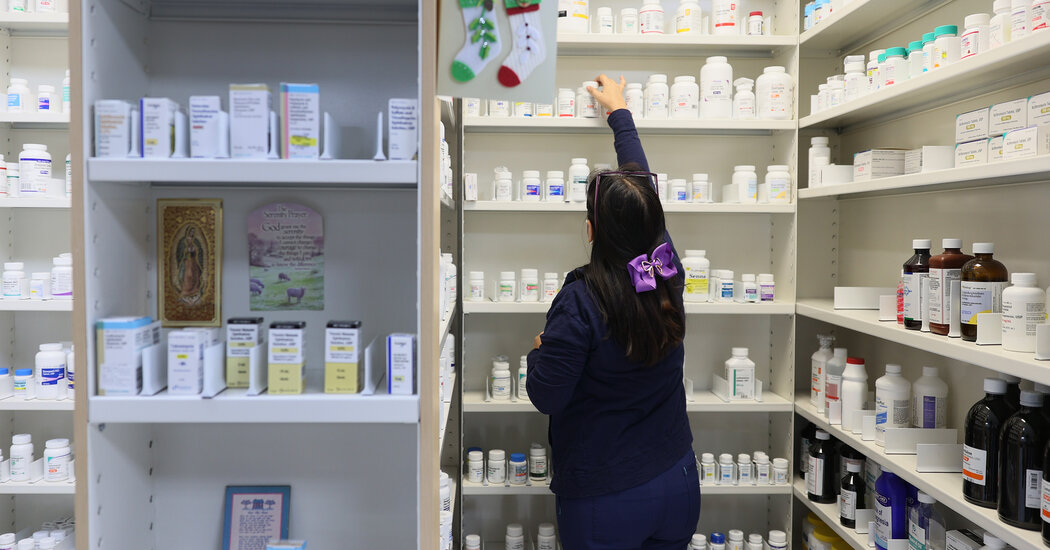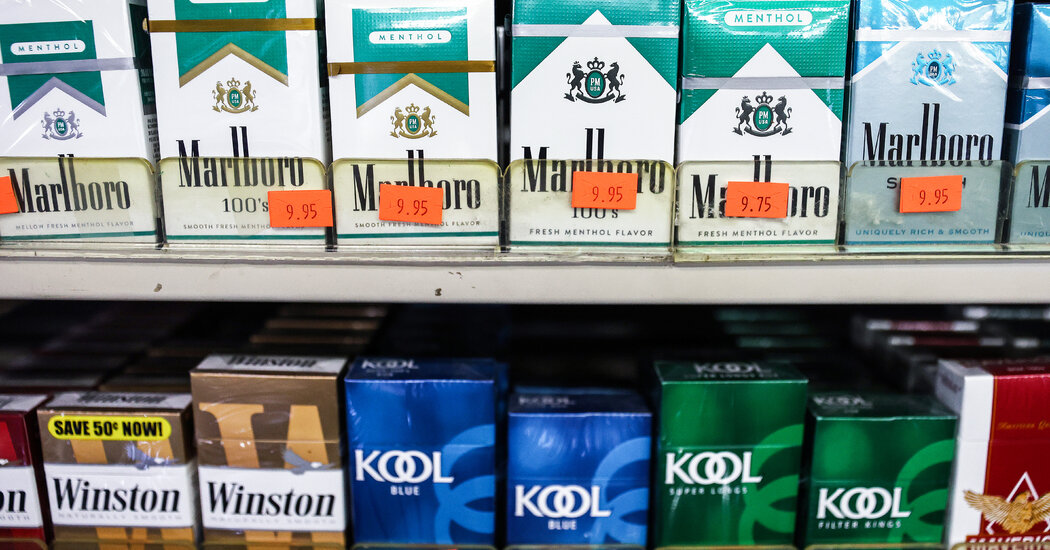F.D.A. to Issue First Approval for Mass Drug Imports to States from Canada
The agency plans to authorize Florida to purchase medicines directly from wholesalers in Canada, where prices are far cheaper. Pharmaceutical companies oppose the plan.The Food and Drug Administration has decided to allow Florida to import millions of dollars worth of medications from Canada at far lower prices than in the United States, overriding fierce decades-long objections from the pharmaceutical industry, according to a senior administration official.The approval is a major policy shift for the United States, and supporters hope it will be a significant step forward in the long and largely unsuccessful effort to reign in drug prices. Individuals in the United States are allowed to buy directly from Canadian pharmacies, but states have long wanted to be able to purchase medicines in bulk for their Medicaid programs, government clinics and prisons from Canadian wholesalers.Florida has estimated that it could save up to $150 million in its first year of the program, importing medicines that treat H.I.V., AIDS, diabetes, hepatitis C and psychiatric conditions. Other states have applied to the F.D.A. to set up similar programs.But significant hurdles remain. The pharmaceutical industry’s major lobbying organization, the Pharmaceutical Research and Manufacturers of America, or PhRMA, which has sued over previous importation efforts, is expected to file suit to prevent the Florida plan from going into effect. Some drug manufacturers have agreements with Canadian wholesalers not to export their medicines, and the Canadian government has already taken steps to block the export of prescription drugs that are in short supply.“Canada’s drug supply is too small to meet the demands of both American and Canadian consumers,” Maryse Durette, a spokeswoman for Health Canada, wrote in an email message. “Bulk importation will not provide an effective solution to the problem of high drug prices in the U.S.”Congress passed a law allowing drug importation two decades ago, but federal health officials delayed implementing it for years, citing safety concerns, one of the main arguments drug companies have used against it. In 2020, President Donald J. Trump pushed the law forward, announcing that states could submit importation proposals to the F.D.A. for review and authorization. President Biden added momentum the following year, instructing federal officials to keep working with states on importation plans.Florida applied and later sued the F.D.A., accusing the agency of what Gov. Ron DeSantis called a “reckless delay” in approving the request. Friday’s announcement grew out of that lawsuit; a federal judge had set a Jan. 5 deadline for the F.D.A. to act on the state’s application.Eight other states — Colorado, Maine, New Hampshire, New Mexico, North Dakota, Texas, Vermont and Wisconsin — have laws allowing for a state drug importation program, and many are seeking, or planning to seek, F.D.A. approval.Colorado’s application is pending with the F.D.A. New Hampshire’s application was rejected last year. Vermont’s was deemed incomplete; a spokeswoman said the state was waiting to see how the F.D.A. handled the applications by other states before resubmitting.Colorado officials have signaled that states may face challenges to their importation plans from drugmakers in Canada, among them familiar names like Pfizer, Merck and AstraZeneca. Some drugmakers have written contracts with drug-shipping companies prohibiting deliveries to the United States, Colorado officials said in a report.Drug importation has broad political and public support. A 2019 poll by KFF, a nonprofit health research group, found that nearly 80 percent of respondents favored importation from licensed Canadian pharmacies.“Importation is an idea that resonates with people,” Meredith Freed, a senior policy analyst with KFF, said. “They don’t fully understand why they pay more for the same drug than people in other countries.”With the 2024 presidential election on the horizon, candidates are looking to claim credit for efforts to reduce drug prices. President Biden is spotlighting the Inflation Reduction Act, which empowers Medicare to negotiate prices directly with drugmakers for the first time, but only for a limited number of high cost medicines. Mr. DeSantis, who is challenging Mr. Trump for the Republican nomination, is touting his import plan.Several experts in pharmaceutical policy said that importation from Canada would not address the root cause of high drug prices: the ability of pharmaceutical makers to fend off generic competition by gaming the patent system, and the federal government’s broad failure to negotiate directly with drugmakers over cost.“Seems like political theater to me, where everyone wants to say they did something to drive down the price of prescription drugs,” Nicholas Bagley, a health law expert at the University of Michigan Law School, said of Florida’s plan.Both Mr. Bagley and Dr. Aaron Kesselheim, a professor of medicine at Harvard Medical School, said that the Inflation Reduction Act is a more direct path to lowering prices; the law’s price negotiation provisions are expected to save the federal government an estimated $98.5 billion over a decade. Drugmakers are suing to block those provisions from taking effect.A protest outside the Pharmaceutical Research and Manufacturers of America in Washington in 2021. PhRMA is likely to file suit to prevent any plan from going into effect.Saul Loeb/Agence France-Presse — Getty ImagesWith its approval in hand, Florida has more work to do. Before it can distribute Canadian drugs, the state must send the F.D.A. details on those it plans to import. The state has to ensure that the drugs are potent and not counterfeit. It also must put F.D.A.-approved labels on medications instead of those used in Canada.The F.D.A. said it would be watching to see if the state upholds safety rules — such as the reporting of any drug side effects — and delivers significant cost savings to consumers. Florida’s approval to import lasts for two years from the date of the first drug shipment.In Canada, health officials have been casting a wary eye on the push to import from their country. In November 2020, shortly after the Trump administration announced that states could submit importation proposals, the Canadian government published its own rule to prevent manufacturers and wholesalers from exporting some drugs that are in short supply.The Canadian government is likely to further restrict exports if they begin to affect Canadians, said Amir Attaran, a law professor at the University of Ottawa. He said the numbers don’t work out for a nation of nearly 40 million to supply medications for a state with 22 million people, much less for 49 other U.S. states.“If all of a sudden Florida is able to extend a vacuum cleaner hose into this country to take what’s in the medicine chest, the supply disruption will be a completely different category,” he said. Dr. Kesselheim, of Harvard, said the F.D.A.’s authorization was unlikely to make a difference in the price of very expensive brand-name drugs, because manufacturers would block wholesalers from exporting the medicines.“I think it’s going to be hard for states to import drugs like that in any kind of scale that would make a difference in terms of lowering prices for patients,” Dr. Kesselheim said. Even so, he said, the F.D.A.’s announcement is significant because it puts to rest the notion that drug importation cannot be accomplished safely.Mr. Bagley of the University of Michigan said there was a simpler solution to high drug prices than patchwork state importation programs: Having the U.S. government negotiate with drug companies over prices, just as many other nations, including Canada, do.“This whole thing is a jerry-rigged, complicated approach to a problem that’s amenable to a pretty straightforward solution, which is that you empower the government to bargain over the price for drugs,” he said. “So instead, we’re sort of trying to exploit the machinery that Canada has created and that we were too timid to create.”
Read more →

